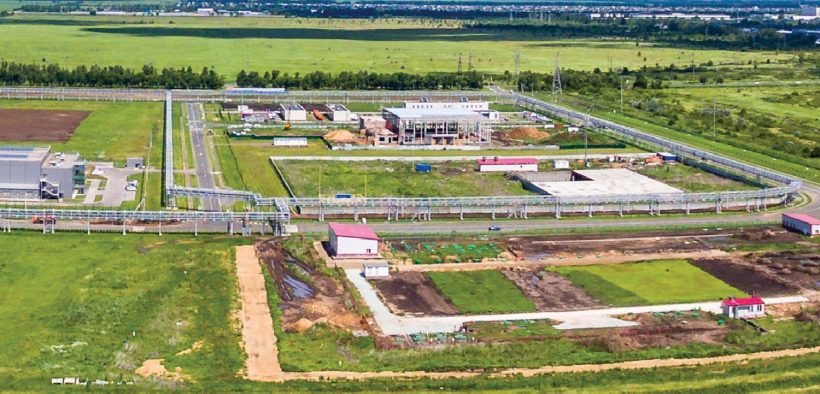
This is the fourth in a series of posts on ‘everyday’ political economy. The long read is now published here.
Special Economic Zones have interested me for a long time because so many of my research participants moved directly from ‘dying Soviet’ factories to shiny new Japanese, Korean, and European intensive productionscapes in the 2000s and 2010s. I write a little bit about this in my book, [opens as a Pdf] but its only recently that I’ve tried to triangulate my ideas with the literature on SEZs.
SEZs (and the related geographical-juridical space of ‘Industrial Parks’) — were created supposedly to kick start diversification and higher-tech production — in reality they serve primarily as accelerated laboratories in deregulation, offering lower corporate taxes, more liberal juridical regulations, ease of transnational movement of goods, and lean ‘sweated’ labour regimes (on the latter see [Morris and Hinz 2017]) [opens as a Pdf]
Taking Kaluga region as an example, SEZs’ success has been in socializing blue-collar locals in accepting downgraded labour terms and conditions and training white-collar workers in more effective coercive surveillance-managerialist methods. In terms of transnational state-capital collaboration to increase productivity, global connectivity (notably with the Silk Road rail system), and in providing a relatively low-tech domestic manufacturing base, SEZs are an outstanding success. For a site selling the benefits of SEZs in Russia see this link.

My main argument is that these effects are not contained by the zonal boundary — they ‘scale’ via further expansion of ‘lean’ enterprises beyond the zone as transnational corporate infrastructure and human capital investment has an effect on the whole region. Indeed, the ‘zone’ is not a spatially contained territory, but an elastic administrative state of exception that has expanded throughout the region to encompass many clusters containing dozens of diverse foreign and domestic firms in urban, brownfield and greenfield sites. In terms of ‘register’ too, the SEZs exercise a strong discursive effect, making new working relations ‘common sense’ beyond the zones themselves, affecting local politicians, employers and workers in other enterprises. Overall the ‘register’ effect multiplier is more important than any administrative-legal deregulation, or should be seen as part of neoliberal scaling itself. Patrick Neveling, writing on India, analyses examples of similar zones a bit differently, as “exemplary for the structured contingencies in global capitalism as these neoliberal regimes were established long before neoliberalism became the defining ideology in global policymaking under the Washington Consensus.” In the Russian case, SEZs are a very recent phenomenon, and their success in register’ and ‘scaling’ is somewhat in contrast to what we think of as typically more dirigiste movements. I guess my point here is that a strong (neo)liberal strain remains, regardless of what happens ‘at the top’ of Russian economic policy. This story also should make us hesitate about too quickly assuming further ‘decoupling’ of Russia from the global economy.
My prior research has documented the ‘burn through’ of the local labour force by the new SEZ companies, [opens as Pdf] and the devil’s bargain facing blue-collar Russians in particular. In the face of societal opposition, libertarian market ideologues need to ‘naturalize’ what is in fact a carefully constructed view of human economies in a set of epistemological precepts that serve politics [Mirowksi 2019]. SEZs in the European Russian context beyond big cities, are important in drawing in new labour to discipline and socialize it. As I was doing my long-term fieldwork in 2010 a remarkable divide opened up before my eyes between those young men who ’embraced’ the SEZ work and went on to get mortgages and foreign cars, and those who ‘rejected’ it for the precarious informal economy [Pdf] and decaying paternalism of the old factories. However, it’s not so simple. Over the longer term, expectations of a social contract, enterprise paternalism don’t completely disappear. Similarly, it’s ironic that the ‘entrepreneurial’ possibilities of the informal economy (as an electrician, welder, builder, trader, etc) actual serve as a limiter to the diffusion I describe of ‘neoliberal governmentality’. I wrote about that indirectly in this summer’s posts about ‘homo sovieticus’ values. Maybe Hillel Ticktin had a point after all, when he proposed that the reality of the pace of work being dictated by the shopfloor itself was an enduring and profound characteristic of the USSR and an impediment to the transition to fully commodified labour. The ‘escape’ to the informal economy often looks like a way to try to retain that ‘autonomy’ in some form.

Pingback: From authoritarian neoliberalism via the control society to surveillance capitalism | Postsocialism